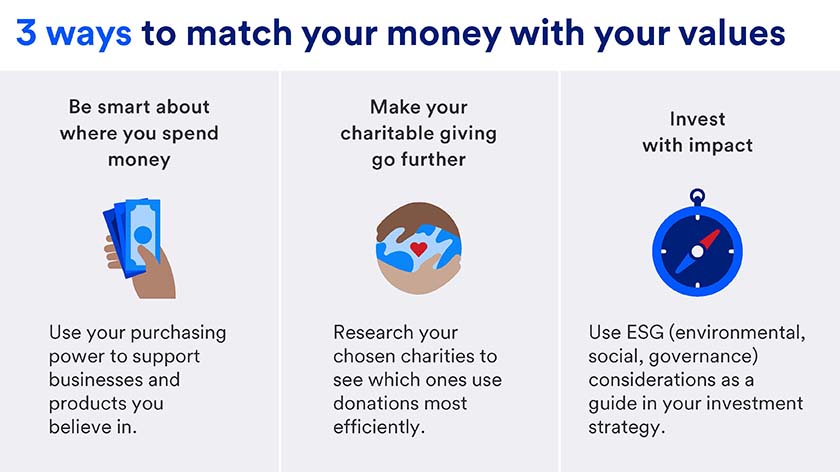
Key takeaways
Instead of waiting until after you pass to support a charity or other cause, aligning your money with your values allows you to do it during your lifetime.
Identify your personal values and then examine how you spend, give and invest your money to see if they’re in alignment.
Tools such as charity watchdogs and impact investing can help you incorporate your values into your financial strategy.
Money can be a powerful tool for you to support the causes and beliefs that are important to you. Whether it’s how you spend, give or invest your dollars, aligning your money with your values allows you to make purposeful choices that you can feel good about—while still planning thoughtfully for your future.
A values-based approach to financial planning has become more common in recent years, as people extend beyond charitable giving or legacy planning to the financial decisions they can make during their lifetime that affect the world at large. “We used to see people hold onto their money, and when they passed, it would go to the organizations that they wanted to support through a will or trust,” says Peter Medin, Wealth Management Advisor with U.S. Bancorp Investments. “But we’ve started to see money moving earlier in people’s lives—so they can actively participate in things that are important to them.”
Let’s examine what it means to align your money with your values, the benefits it can bring and how you can incorporate this approach into your spending, giving and investing.
What are financial values?
Personal values are key drivers of your behaviors, the decisions you make and the actions you take. It may sound obvious, but before you can align your financial decisions with your personal values, you need to identify exactly what those values are. Make a list of three to five values or priorities that you can use as a lens to filter your financial decisions.
These values can, but don’t have to, tie into specific causes or movements—like sustainability, for example—or they can be broader, such as valuing family or integrity. Getting clear about what matters most to you will be essential for when you examine where you spend your money, which charities you support and how you want to invest.
How to align your choices with your financial values
Once you’ve identified your core values, you can see how they align with your financial decisions, adjusting as needed. Start with these tips to bring three financial areas more in line with your values.
Financial values: Intentional spending
Over the past several years, there’s been increased consumer demand for transparency among companies and an increase in the practice of “conscious spending” or “intentional spending.” This simply means aligning your purchasing decisions with what matters to you.
For example, if a company is involved with a cause you don’t support, you may choose not to spend money there. Do some research to find out if places where you frequently shop are aligned with the values you established. If not, it may be time to research alternatives.
Though this process may sound a bit daunting, there’s a wealth of information available online to research where companies stand on major issues. “It’s become easier than ever to find out what companies are doing and decide whether or not you want to be a part of it,” Medin says.
“I think there are always benefits to doing things that are in line with your moral compass, and there are always benefits to feeling good about the things you invest in.”
Peter Medin, Wealth Management Advisor, U.S. Bancorp Investments
Money is power, and by choosing to spend your hard-earned dollars at companies that fit more closely with your values, you can feel better about how your money will be used.
Financial values: Informed charitable giving
Charitable giving seems like something that should naturally be aligned with your values, but it’s important to do your due diligence before allocating your dollars to a new organization. If you donate to a charity because it’s a cause you feel strongly about, you’ll want your donation to be maximized, and that means you should be looking for efficiency in how those organizations are run.
The BBB Wise Giving Alliance, Charity Navigator and CharityWatch are three organizations that examine how various charities spend your donations and can help you determine the most effective ones to support.
Financial values: Impact investing
Medin notes an uptick in ESG (environmental social governance) investing in recent years, as more people see their investment portfolio as an opportunity to bring their investing decisions more in line with their personal values.
If you want to embark on this path—also known as impact investing, values-based investing or socially responsible investing—start by taking a closer look at your holdings.
“You’ll want to go through a handful of your investments and evaluate whether or not you feel comfortable aligning your money in those spaces,” Medin says. “While it’s easier to do this exercise the smaller your portfolio is, it can be achieved with some due diligence.”
By taking a closer look at the contents of your portfolio, you might discover that there are companies that don’t align with your personal values. Although it takes some extra time, going through this process can be rewarding and help your money support your values instead of working against them—and a financial professional can help you throughout this process.
Can values-based investing affect your portfolio performance?
When you use your money to support causes you care about and companies that are in step with your beliefs, you can derive a greater sense of meaning and purpose from your decisions.
However, some people worry that if they align their money more closely with their values, they’ll miss out on a well-rounded portfolio. For example, by declining to support certain companies because of what they stand for, it might mean you remove them from your investment portfolio. While it’s true that whenever you limit what you invest in, there is the potential for decreased returns, it’s not so cut and dried. There are plenty of ways to diversify your portfolio—and the companies you do choose to support in place of the ones you’ve eliminated can offer a potential for increased returns as well.
“There are ETFs [exchange-traded funds] dedicated to companies that have more than a certain percentage of women on boards,” Medin notes, “and there are studies that say if you have a well-diversified board, those companies tend to do better and yield higher returns, too.”
Plus, you’re more likely to make better decisions—both personally and financially—when you’re taking a more informed look at where your money is going and what you want it to achieve.
“There are plenty of people who don’t want to spend every day thinking about or looking after their investments,” Medin says. “But if you’re passionate about something and it causes you to pay attention to it, then you’ll likely make better decisions about it than if you throw a dart at the board and see what happens.”
Revisit your financial values-based strategy regularly
The process of aligning your financial decisions with your personal values is not a set-it-and-forget-it exercise; rather, it is an ongoing exercise to regularly revisit. With some extra forethought and strategy, you can create conscious financial practices that exist in harmony with your personal values.
“I think there are always benefits to doing things that are in line with your moral compass,” says Medin, “and there are always benefits to feeling good about the things you invest in.”
When it comes to creating a financial plan, you don’t have to go it alone. Learn about our team-based approach to planning.
Explore more
How to set financial goals
Setting and working toward financial goals becomes easier when you reflect on your intentions.
Our goals-focused approach puts you first.
We can help you identify and prioritize your financial goals and design a plan to work toward them, making adjustments as your needs evolve.



